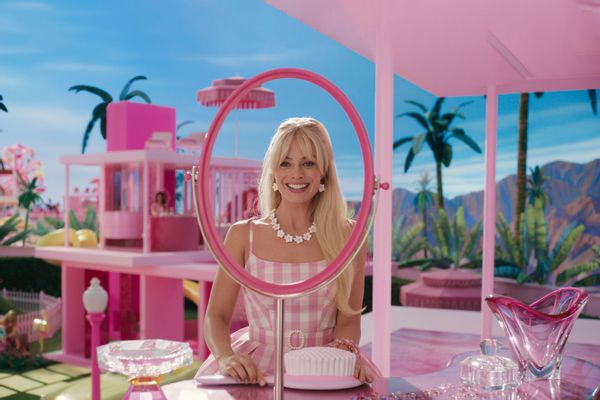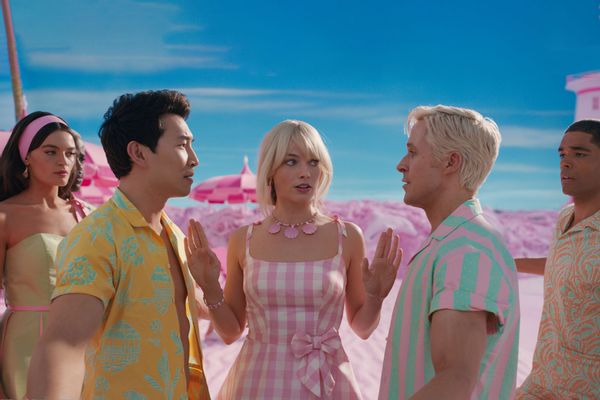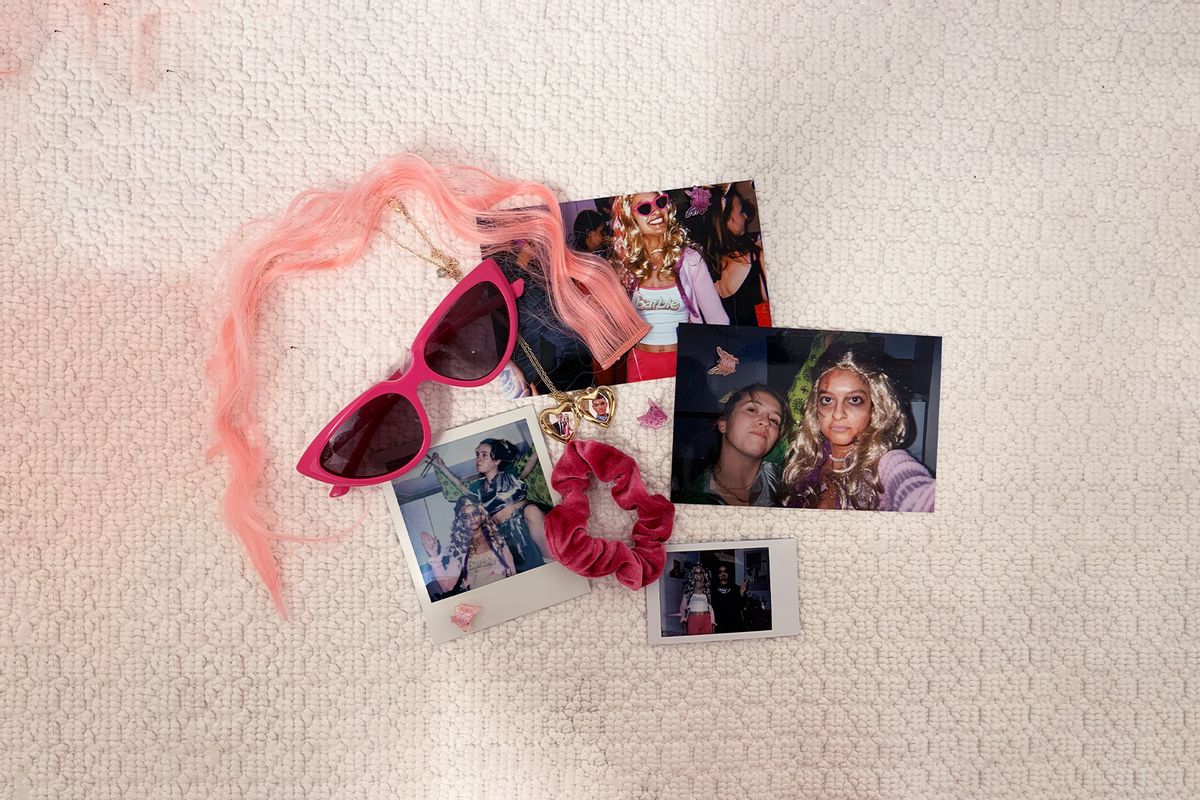For Halloween last year, I dressed as Barbie and planned the costume way in advance: a pair of pink bike shorts, a tank top with the Barbie logo splayed on the front, and a pink cardigan with faux fur trim that I found on sale. I made a trip to Claire's and bought a little plastic pink purse, some play jewelry, cheap pink makeup and a pink and gold locket that I put two tiny pictures of Ken inside. I even wore the most push-up bra I owned, which I hadn't worn in years, all in an attempt to become Barbie.
"I want yellow hair like Barbie."
And finally, the last piece of the puzzle: the hair. I pinned my own hair up and put a little mesh cap over it before fitting the cheap, synthetic, blonde wig I bought at Spirit Halloween over my head. It was big and itchy and gave me a headache by the end of the night, but it was all worth it to fully embody the icon that is Barbie.
Growing up, I was obsessed with Barbie.
At age five, my mom picked me up from kindergarten, letting me sit in the front seat of her silver Mitsubishi because it was the '90s, and parents were a little less concerned about car safety.
"What did you do today?" my mom always asked as we made our way home. I'd usually tell her the banal details of my life, which my five-year-old self thought was gripping. But on this particular day, I had another notion in mind.
"I want yellow hair like Barbie," I said.
My hair was dark and curly, and by the end of every day, I'd come home with my frizzy tendrils filled with knots. I looked nothing like Barbie, with her long, perfectly straight, blonde hair, shiny like no one's hair has ever been before. Barbie and I were different in every way. For starters, she was white, while I was an Egyptian American girl with brown skin and black hair, and I never felt perfect — not like Barbie.
I had a giant bin full of Barbies at home — doctor Barbie, shopping mall Barbie, gymnast Barbie, a Barbie whose hair you could cut and Velcro back on, and the list continues. I created an unending number of storylines with the dolls, my own little soap operas starring Barbie, Ken and the gang. My dad even used to bribe me with Barbies. When I refused to see "Star Trek" in theaters with him, all he had to say was, "I'll get you a Barbie" to get me to come along.
"Barbie is everything," reads the "Barbie" movie poster, with a photo of Margot Robbie laying on her side, her blonde hair perfectly coiffed over a pink backsplash.
To me, Barbie was everything and brought me happiness in a lot of ways. I was an only child until the age of 10, and Barbie was how I entertained myself. She unlocked my creativity, allowing me to craft my own little stories before I even knew I wanted to be a storyteller. In the world I'd created, shopping mall Barbie was the coolest and most popular of the gang because she had the softest hair and chic-est accessories. Gymnast Barbie was her best friend, and there was always drama with Ken, as mermaid Barbie, with her tangled hair, would swoop in from her ocean life and try to steal Ken away from shopping Barbie, who of course would always win in the end.
 Margot Robbie as Barbie in "Barbie" (Courtesy of Warner Bros. Pictures)Barbie is everything, but that encompasses both good and bad. Ever since her inception in the 1950s, Barbie was the epitome of beauty and femininity, even though no one actually looked like her. She embodied what women were supposed to want — skinniness, whiteness, blonde hair, blue eyes, tiny nose, big boobs, feet permanently molded for heels. These colonial and patriarchal ideas of beauty and femininity seeped into my brain.
Margot Robbie as Barbie in "Barbie" (Courtesy of Warner Bros. Pictures)Barbie is everything, but that encompasses both good and bad. Ever since her inception in the 1950s, Barbie was the epitome of beauty and femininity, even though no one actually looked like her. She embodied what women were supposed to want — skinniness, whiteness, blonde hair, blue eyes, tiny nose, big boobs, feet permanently molded for heels. These colonial and patriarchal ideas of beauty and femininity seeped into my brain.
We need your help to stay independent
Barbie Halloween was not the first year I dressed as a blonde.
To me, she represents something both nostalgic and insidious. Even though I loved Barbie, she made young girls everywhere believe they weren't everything, myself included. Unrealistic beauty standards were everywhere — in magazines, on television, on billboards — and Barbie indoctrinated children all over the world with an idea of beauty and femininity that centers whiteness, and those ideas were reinforced by every single type of media we consumed.
To this day, I sometimes hate everything about myself, wondering if I'm pretty enough or interesting enough or smart enough or fun enough. Of course, I don't compare myself to Barbie anymore, but Barbie was likely the inception of my insecurities. And as an anxious Egyptian kid growing up in America in the '90s and early 2000s, I often hated everything about myself. My hair was too frizzy; I wore glasses; I was too shy. I didn't even realize it then, but those thoughts permeated my mind, America's toxic ideals taking over. So it made sense that I wanted to look like Barbie.
* * *
Interestingly enough, Barbie Halloween was not the first year I dressed as a blonde. It's actually become a running joke among my friends, and every year they ask if I'm planning on wearing another blonde wig. More often than not, my answer has been yes.
In the past 10 years, I've dressed as Sookie Stackhouse from "True Blood," Robin Sparkles (the blonde, pop star version of Robin) from "How I Met Your Mother," Angelica from "Rugrats," Taylor Swift, Eleven from "Stranger Things" when she wears a blonde wig, Uma Thurman's character from "Kill Bill" and then, the final blonde: Barbie. Maybe all of those other costumes were leading up to her, a slow transformation into the ultimate blonde.
Barbie is everything that I'm not. I hardly have any pink in my wardrobe, and I almost never wear heels. After getting my nails done neon pink the day before Halloween weekend, I went to a friend's birthday party and made sure to tell anyone I met, "This isn't me," ensuring them that my pink nails were for Halloween only. But in becoming Barbie, I fully separated from myself, embodying a new persona altogether. For one night only, I could turn into everything I wanted to be when I was five.
But the difference is, I wasn't five anymore, and I didn't actually want to look like Barbie. As I grew up, the world started to change. People began to call out the media and corporations for pushing these old ideals of whiteness, thinness and unattainable perfection onto us. Of course, for me, the change was gradual. I didn't suddenly wake up one day with a burst of confidence. For years, without even realizing it, I worked to remain in proximity to whiteness. I flat-ironed my hair after every wash, keeping it sleek and straight, just like the white girls I knew. I can still hear the sizzle of my flat iron, and every once in a while, maybe at a salon, I'll smell the familiar scent of burnt hair, transporting me right back to high school and college.
But slowly, my desire to fulfill these colonial beauty standards began to subside. The change occurred alongside my increased interest in politics and social issues. I started to pay attention in a way I hadn't been before, and as a result, I grew disgusted with wanting whiteness. I was angry at myself for ever wanting to look like the rich white girls I went to college with, and I started to express pride in my culture, my hair, and all the ways I differed from those girls. Eventually, the idea of wanting "yellow" hair or proximity to whiteness at all seemed comical, though looking back, I still feel sad for the five-year-old version of me who didn't have a template for beauty outside of whiteness.
 Emma Mackey as Barbie, Simu Liu as Ken, Margot Robbie as Barbie, Ryan Gosling as Ken and Kingsley Ben-Adir as Ken in "Barbie" (Courtesy of Warner Bros. Pictures)Nowadays, Barbie makes more of an effort to be inclusive. We have Barbies with different skin tones and hair colors/textures, Barbies with disabilities, and even Barbies with different body types (although most are still pretty skinny) in an attempt to show that anyone can look like Barbie. Though in reality, nobody looks like Barbie. While Margot Robbie's Barbie is beautiful and as close to the original as anyone can look, even she doesn't fit, not perfect enough for the world in which she exists, as her feet become flat, and her consciousness wakes up to the fact that she lives in a fantasy. Barbie herself realizes she isn't real, just like the ideas of beauty and femininity she once promoted aren't real.
Emma Mackey as Barbie, Simu Liu as Ken, Margot Robbie as Barbie, Ryan Gosling as Ken and Kingsley Ben-Adir as Ken in "Barbie" (Courtesy of Warner Bros. Pictures)Nowadays, Barbie makes more of an effort to be inclusive. We have Barbies with different skin tones and hair colors/textures, Barbies with disabilities, and even Barbies with different body types (although most are still pretty skinny) in an attempt to show that anyone can look like Barbie. Though in reality, nobody looks like Barbie. While Margot Robbie's Barbie is beautiful and as close to the original as anyone can look, even she doesn't fit, not perfect enough for the world in which she exists, as her feet become flat, and her consciousness wakes up to the fact that she lives in a fantasy. Barbie herself realizes she isn't real, just like the ideas of beauty and femininity she once promoted aren't real.
* * *
When I dressed as Barbie for Halloween, I wasn't making an attempt at perfection or beauty. To some extent, my costume was a tribute to Barbie, because even though she's toxic in so many ways, she's also iconic. But at the same time, my costume showed how laughable it was that Barbie ever represented beauty and the ideal of femininity in the first place. My outfit was tacky, and my jewelry was purposefully childish. The blonde hair looked ridiculous on me, and that was the point. While I wasn't exactly subverting Barbie's look, the outfit made it apparent to everyone that Barbie as the template for beauty was a joke.
I went to three nights of Halloween parties last year, and on the last night — Halloween — I decided to switch up my costume because by then, that perfect Barbie look started to get boring. I took the pristine white and pink Barbie shirt and splashed fake blood all over it. I changed my makeup, adding dark circles under my eyes, scars on my face done with eyeliner, and fake blood that dripped from my nose and mouth. I tousled the hair on my blonde wig and became Zombie Barbie, destroying the image of perfection that she once represented. I turned her beauty, her blondeness, her perfection, into something ugly and monstrous. In some ways, by becoming a zombie version of Barbie, I effectively killed the classic, blonde beauty, decolonizing her not only in my mind, but also by subverting the costume for all to see.
Next Halloween, I don't want to be another blonde. I've already planned out a costume in my head — Trinity from "The Matrix" — a character that could be seen as the opposite of Barbie. Now that I've dressed as the ultimate blonde and turned her into something else, the journey feels complete.
Of course, there is something to be said about the fact that I've mostly dressed as white characters for all of my life. Am I really participating in any form of decolonization if I continually pay tribute to white characters? Sometimes, though, it feels like I don't have many other options. Up until last year when "Moon Knight" came out, introducing an Egyptian superhero, who else could I have dressed as? Cleopatra? Princess Jasmine? I'd done both of those already as a kid. The media I consume is often dominated by whiteness, and when it isn't, the characters still aren't my ethnicity. Therefore, no matter what costume I consider, I'm still reminded that the process of decolonization for myself as well as the world we live in, is ongoing.

Shares